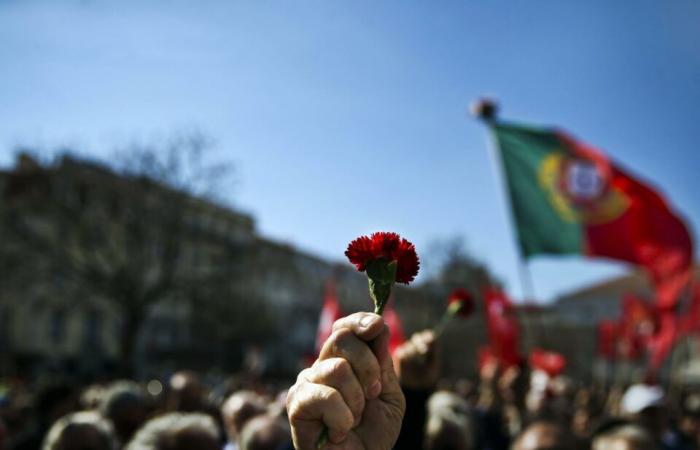Half a century ago the Portuguese lived through the Carnation Revolution and today they wield carnations and shout freedom. Outside, the international press reports on the military operations that ended the authoritarian regime.
This Thursday, April 25, 2024, marks the military coup that led Portugal to establish a democracy. Currently, the Portuguese have lived in democracy for longer than the dictatorship and Estado Novo lasted (48 years).
Half a century ago the Portuguese lived through the Carnation Revolution and today they wield carnations and shout freedom. Outside, the international press reports on the military operations that ended the authoritarian regime.
For example, “El Pais” remembers the five thousand soldiers who took to the streets on the night of April 24 to 25, 1974. “Each of them played a crucial or secondary role in contributing to the success of that historic mission, which unfolded without violence”, writes the journalist.
Spanish Tereixa Constenla recalls that citizens joined the military to prevent a reversal of the entire situation that had been happening since the first radio password.
This newspaper also spoke to some of the names who saw the revolution happening in front of them. He spoke with José Alves da Costa, who received the distinction of Grand Master of the Order of Liberty, for having refused to shoot at the troops accompanying Salgueiro Maia, also with Manuel Correia Silva, who watched Marcello Caetano in the armored vehicle after he having surrendered to the military, and also with José Manuel Costa Neves, who led the entire occupation of Rádio Clube Português, where the Armed Forces Movement transmitted communications from 4:26 am on the day of freedom.
In another text, still evoking Portuguese freedom, the Spanish journalist recalls what was achieved in the year in which democracy was celebrated: “For every year of Portuguese democracy there is a far-right deputy in the Assembly of the Republic. Fifty years and fifty deputies. A chance coincidence that, however, exposes the contradiction that Portuguese society is experiencing today, proud of the democracy it achieved in 1974 and surprised by the growth of disenchanted people who have embraced right-wing populism.”
The French “Le Monde” is inspired by a photograph from May 1, 1974, days after the Carnation Revolution, where freedom was already felt. Using images taken by Gérald Bloncourt, who left for Lisbon when news of the movement spread, journalist Guillaume Delacroix spoke to José Vieira, a friend of the photographer.
In this publication, the Portuguese, currently 66 years old, recalls that “the crowds hypnotized” previously by Salazar, whom he calls “a kind of priest with a falsetto voice”, “turned into a marching people, shouting slogans” from April 25th.
In the same publication, journalist Raphaëlle Rérolle gives the motto: “50 years ago, the Carnation Revolution ended Portugal’s dictatorship in one night”. However, it was not easy, as the participants told him.
“Reuters” chooses to make a quick visit to the Capitães de Abril coup, highlighting the celebrations of the day on which Portuguese democracy turns 50. The agency returns to the beginning of this Thursday, when the two frigates of the national Navy docked in the Tagus, together with the vehicles and military personnel in Praça do Comércio.
In the photo report, “Reuters” accompanies the living soldiers on the ride of ‘Bula’, who is the most recognized chaimite of the revolution.
In turn, “BBC” highlights the songs from April: “E Além do Adeus” by Paulo de Carvalho and “Grândola, Vila Morena” by Zeca Afonso.
“The military specifically chose the song ‘And After Goodbye’ because it was not controversial. He went to the Eurovision Song Contest that year [1974]. The second was ‘Grândola, Vila Morena’. The idea was for the military to wait for a certain moment and when they heard this song on the radio they knew it was the signal to go ahead with the coup”, says Alex Fernandes, author of the book “The Carnation Revolution”.
To the British publication, Alex Fernandes explained the moment when Celeste Caeiro gave a carnation to a soldier who had asked him for a cigarette and he placed the symbol of freedom on the rifle and named the day on which Portugal put an end to what remains until the today as the “farthest fascist regime in Europe”.
Thus, 50 years later, the international press remembers one of the most important days for Portuguese democracy.
Tags: century Portuguese democracy
--






